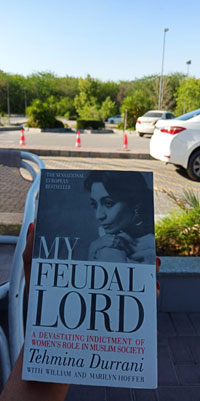By: Kainat Saif
This european best seller masterpiece is written by Tehmina Durrani with William and Marilyn Hoffer as co-authors. Tehmina Durrani is not just a great writer but also a women’s and child’s rights activist. My Feudal Lord is her First book and shook conservative Pakistani society to its core because of obvious reasons. She has also established a well-fare foundation, aimed to support Eidhi’s cause “Humanitarianism”.

In this autobiography she puts a light on the lives of the ruling elite – Politicians, officials, and feudal lords. While talking about the artificiality of elite class she explained schizophrenic; an appearance of perfection that is more important than genuine feelings. Ever heard about “all that glitters is not gold?” this is true on so many levels.
At that time, even in the ruling elite class the socially acceptable and available future for girls was to wait for man: to get married – only aspiration. Sounds familiar? (Yes, an induced concept of society in every era). Dark skin tone was not tolerable and is not even admissible now. Submission was the only way to survive in desi house-holds. Being obedient was not enough if you don’t look like one. Home was/is always the first place to install low-self esteem by transgressing confidence.
The rich get richer and the poor become poorer. This inequality is generated by “masters”. As to talk about feudalism, Feudalism in itself is a license or a tag of authority to plunder, rape, and even murder. As feudal lords are the law of their land and in case they are in trouble well, money and land can buy you loyalty of those in power. These feudal lords consider themselves as “envoys of Allah”, however, they defend their cruelty and injustices through their tailored interpretation of Quran and Islam. In typical feudal Dera’s men are the ultimate king and women are treated as slaves.
This book also talked about punishment of illicit sexual relationships. I would like to take this opportunity as a shariah student to describe the difference between adultery and fornication, their punishments and reason behind such stringent penalties.
Fornication is generally consensual sexual intercourse between two people not married to each other. However, on the other hand when one or more of the partners having consensual sexual intercourse is married to a third person, it is called adultery. Punishment for fornication is 100 stripes and adultery is stoning to death. For the liability of this punishment the conditions are following:
- Must be proved by testimony of four male Muslim eyewitnesses to the actual act of penetration.
- Or a confession repeated four times in explicit words and not retracted later.
- The offenders must have acted of their own free will.
Islam is a religion of peace and doesn’t support violence, however, to hold up moral values and to discourage vulgarity capital punishments are for deterrence. Had it not been just for freighting purposes the conditions to prove zina would have been easier.
As a husband Mustafa Khar (a well known Politician and a feudal lord from Kot Addu, Multan) was a monster and a nightmare but as a Politician he was a lion of Punjab. He supported the cause of Zulfiqar Ali Bhutto and was considered as the right arm of bhutto. This book explained the events that followed the separation of Pakistan into two units: East Pakistan (Better Known as Bangladesh) and West Pakistan. Struggles of Mustafa khar alongside Bhutto to resist Zia’s Regime/Dictatorship and restore democracy are also commendable. In this book one can find the formation of people’s liberation army by Bhutto brothers and depicts a story of events in becoming of benazir bhutto as a Prime Minister of Pakistan.
While in his exile, Mustafa khar had many clandestine meetings with Indian authorities and he was arrested for treason as soon as he touched down Pakistan. Tehmina Durrani while many times being suppressed by him and tried to part her ways decided to give him one last chance while he is in jail. Mustafa Khar utilizes Tehmina as her last resort to get out of jail and get his table served. He taught her political tactics to make allies, give talks at political gatherings, and everything to feed masses with the urge of democarctic ruling (Which was only possible through Khar). She held his political campaigns, talked to generals for negotiations and surprisingly convinced them. Finally, when Mustafa was out of the jail and she saw Tahmina as a different and strong personality just like most of the men he was not able to digest that. Men only like strong and independent women as an idea; a fantasy.
This autobiography has some intense feelings in it of love, hate, and every emotion that is in between. I went through a rollercoaster of sentiments throughout reading and equally learned a lot. After reading this book I want to encounter a feudal system once to explore and gain exposure of this complex arrangement. Share what are your learnings/feelings after reading this book. (on another note: If you’re one feudal lord reading this, invite me to get to know and write about feudalism more).
The writer is a law student, she can be reached at [email protected]



